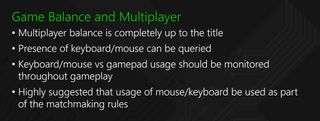Official Xbox mouse and keyboard support could be amazing (and disruptive)
Mouse and keyboard support for Xbox is finally on the horizon, but what does that mean for gamers?

Mouse and keyboard support for Xbox has been in the cards for years at this point, and finally, Xbox head Phil Spencer announced that it's just around the corner. It'll become available for select Xbox Insiders after RS5 ships in October, and will be compatible with Warframe starting out, before expanding to other titles.
Mouse and keyboard very close to coming to Xbox console. Lots of developer options to ensure fairness and a great experience. Choice is in the hands of the developer to do multiplayer pools (controller only, kb/mouse only, any, etc.). Soon! #XboxMouse and keyboard very close to coming to Xbox console. Lots of developer options to ensure fairness and a great experience. Choice is in the hands of the developer to do multiplayer pools (controller only, kb/mouse only, any, etc.). Soon! #Xbox— Mike Ybarra (@XboxQwik) September 25, 2018September 25, 2018
Mouse and keyboard support has an odd relationship and history when it comes to consoles. For example, the PlayStation 4 already supports mouse too in some cases, Final Fantasy XIV: Realm Reborn was designed PC-first, and supports mouse inputs on Sony's console. Both the Xbox 360 and Xbox One support keyboard inputs, occasionally for games, with Final Fantasy XI being playable completely with a keyboard back on Xbox 360. It goes to show that some games simply play better with a keyboard and mouse, and finally, Microsoft is acknowledging it.
We exclusively reported Microsoft's plans to bring mouse and keyboard support to Xbox back in June 2018, and inside those documents, we got an idea about how Microsoft intends to implement the features for developers, while protecting the console experience Xbox gamers know and love.
Let's dissect what mouse and keyboard support for Xbox will, and won't look like, when it finally goes public.
An explosion of new games
The first thing to note is that Microsoft is putting mouse and keyboard support firmly in the hands of developers. Microsoft will not dictate whether a game is required to support these inputs or not, and controller-enabled games will remain the default. Our original documents from early in 2018 seemed to indicate that developers would be unable to make games exclusively for mouse and keyboard, and that controller support would remain mandatory. However, Phil Spencer's language in the announcement video seems to indicate this stance might have changed.
Indeed, in previous conversations with developers bringing PC-native games to Xbox, one of the most difficult aspects of development is reworking user interfaces and controls to be gamepad-friendly. If Microsoft allowed PC devs to port their games as is without having to include controllers, it would save them a huge amount of work and investment. Also, as noted by Spencer in the video, some games simply handle better with a mouse and keyboard. In conversations with Blizzard developers previously, they had noted to me how Heroes of the Storm, the company's colourful MOBA strategy game, simply wouldn't work with a controller. Heroes would have to be completely rebalanced, maps would have to be reworked, among other things, it would almost, effectively, be a separate game, and thus an investment risk.

If Microsoft has lifted the requirement for developers to default to controller, then games that have never found an audience in the living room could begin making their way across. This includes hugely popular simulation games like Football Manager or Planet Coaster, actions-per-minute intensive strategy games like Age of Empires II and StarCraft, or hardcore PC shooters like Counter-Strike: GO, which never truly found an audience on console.
Get the Windows Central Newsletter
All the latest news, reviews, and guides for Windows and Xbox diehards.
We've also heard some credible rumors that Microsoft is working with Valve to further bridge the networking gap between Xbox and Steam's networking platforms, which would vastly decrease the risk for PC game developers to invest in bringing multiplayer titles to Xbox One (and indeed, the Microsoft Store on PC). Killer Instinct already enjoys cross-platform connectivity, and we've heard rumors of Microsoft's underrated RTS Halo Wars 2 heading to Steam for quite a long time. The issue has always been how to separate player pools by input, which Microsoft is working to solve with these features.

In this scenario, an Xbox One would effective becomes an affordable, if simple gaming PC, more accessible to the masses than a proper Windows gaming rig. New freedoms bring new risks and uncertainty, though, and the success or failure of mouse and keyboard on Xbox One will hinge on its implementation from developers.
Potential pitfalls

Sea of Thieves already allows mouse and keyboard PC players to share a world with controller-using Xbox players. Mouse and keyboard inputs allow you to turn faster, without sacrificing aiming precision. If you want to turn faster using a controller, you'll have to turn up the joystick sensitivity and thus, lose precision in the process. As such, in shooters, this grants mouse players a considerable advantage, an advantage which is often abused quite prevalently even now in on Xbox.
You can use a mouse and keyboard in Xbox One shooters, using input-modifying devices like the XIM that mimic the signal from a controller, despite the fact you're using a mouse. Killcams in Call of Duty and other games expose XIM-using players, who turn extremely fast and acquire targets almost instantaneously, obliterating the competition. It's cheating, basically. Thankfully, Microsoft is addressing this problem as part of this package.

As part of the toolsets Microsoft is building to allow developers to separate multiplayer pools by input device, new tech will begin preventing players from circumventing input segregation. As long as developers leverage it, of course. Therein lies a potential pitfall with this system.
The potential in robust mouse and keyboard support for Xbox games is quite clear.
By taking a hands-off approach, Microsoft is allowing developers to decide the extent to which input mixing will take place in multiplayer titles. In non-competitive games like Sea of Thieves, it might not be a huge problem. However, being destroyed by a player who is clearly turning faster and acquiring targets far more rapidly due to their choice of input device makes for a pretty crappy experience, and Microsoft surely knows this. You'd hope other developers know it too, but even if they do separate players by input device, you end up with divided player pools, slower matchmaking times, and less-balanced matches. Linking Steam PC versions to their Xbox counterparts might help offset this player pool shrinkage to some degree, but it all depends on whether or not developers bother to set it up (if it's even planned).
Microsoft needs to make it as seamless as possible to connect different networks, if that is truly the goal, or we could end up with problems seen by Call of Duty on the Microsoft Store for PC, which has virtually zero players online at any given time.
Huge potential

The potential in robust mouse and keyboard support for Xbox games is quite clear, particularly as future iterations of Xbox consoles will further bridge the gap between PC and Xbox console game development. In the future, theoretically, it would be trivial for a PC game developer to bring their title to Xbox and vice versa, with all APIs and code unified across platforms. Naturally, that includes mouse and keyboard inputs, and the ability to detect input types dynamically.
Minecraft should be seen as the prototype for this future game development model. Minecraft intelligently detects whether the user is using a mouse and keyboard, a touch screen, or an Xbox controller, and updates its UI on the fly to reflect those inputs dynamically. Microsoft is applying that mentality to all games, in a world where the user will roam from device to device, whether playing titles natively or via the cloud, streamed to mobile devices from the internet.
Whether Microsoft's grand vision translates into an explosion of PC-oriented titles hitting Xbox One remains to be seen, but it's great to see these artificial barriers come down. Bring on the future, I say.

Jez Corden is a Managing Editor at Windows Central, focusing primarily on all things Xbox and gaming. Jez is known for breaking exclusive news and analysis as relates to the Microsoft ecosystem while being powered by tea. Follow on Twitter @JezCorden and listen to his XB2 Podcast, all about, you guessed it, Xbox!
